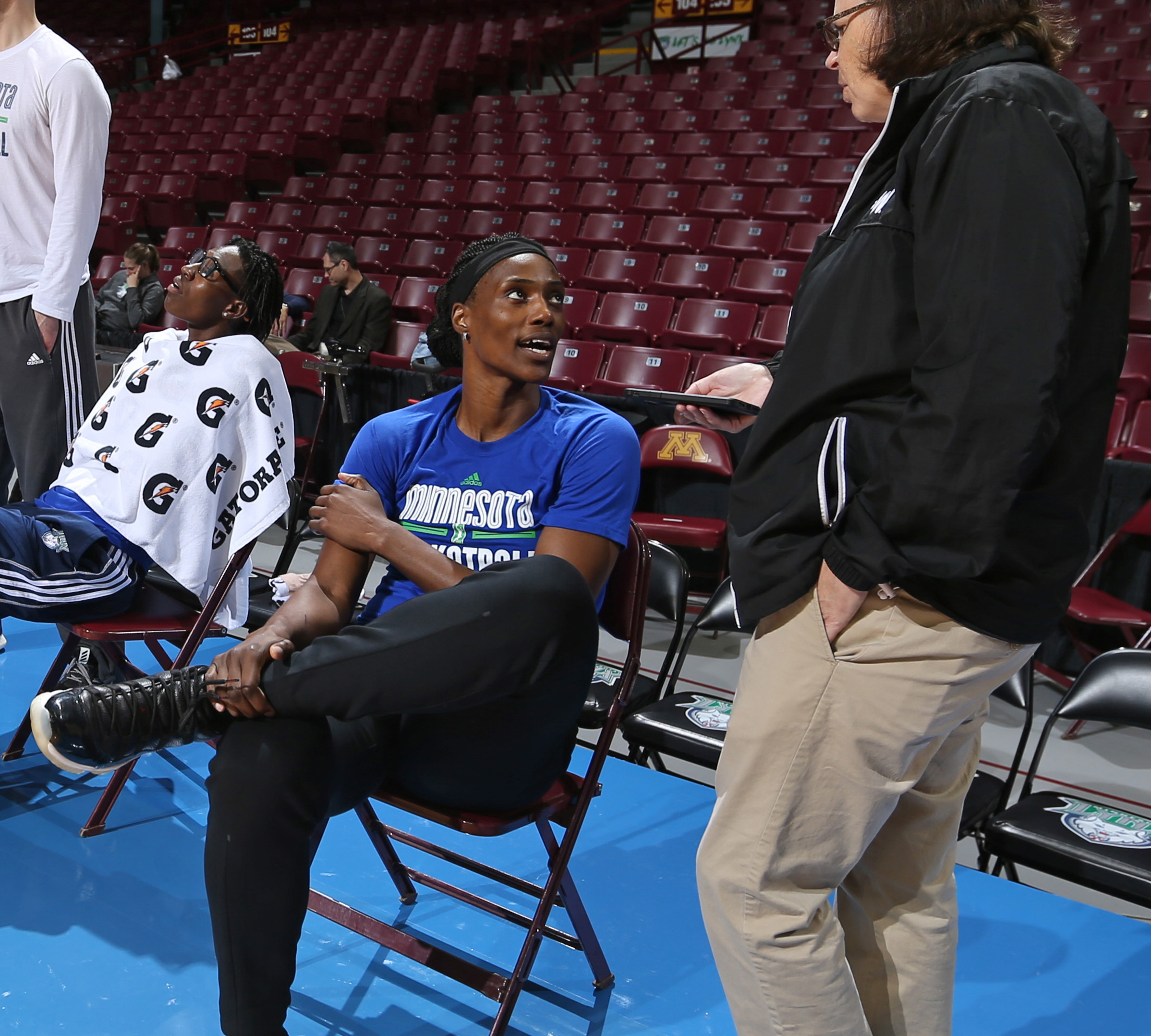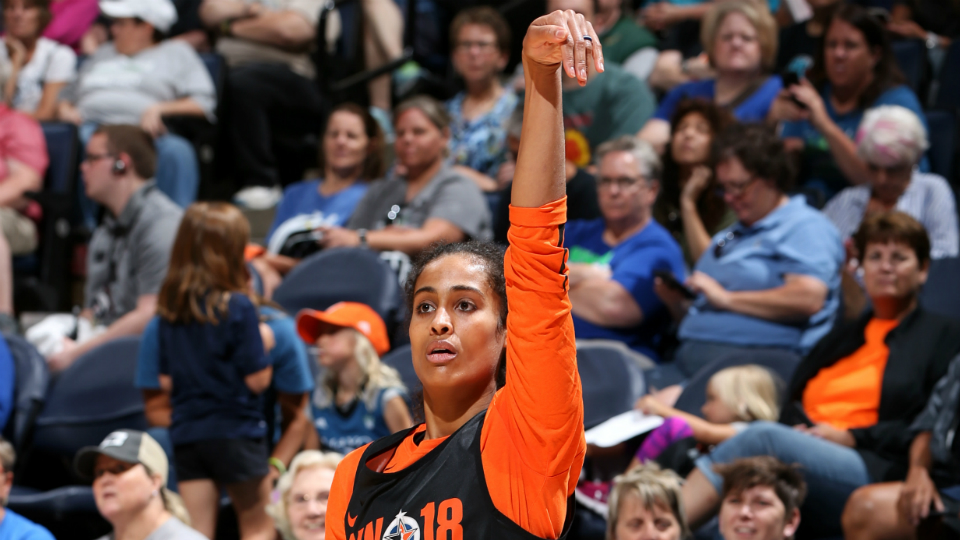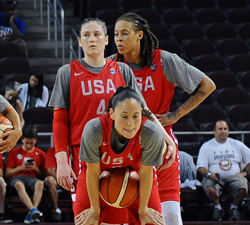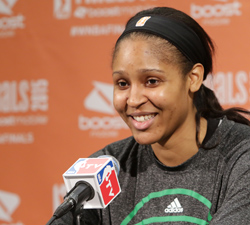Women's History Month: The Defining Eras | The Minnesota Lynx

In the final segment of our three-part Women’s History Month series, we conclude celebrating the defining eras in WNBA history with the Minnesota Lynx.
It mostly took place in the locker room.
Seimone Agustus was the class clown. Maya Moore was the instigator/lead singer. Rebekkah Brunson, Lindsay Whalen, and the rest of the team played their roles too, as did Sylvia Fowles when she joined the team.
“Practice was never quiet,” said Fowles via phone recently. “Maya (Moore) was the full force behind all the drama that went on. It seriously was like a show in practice and before games.
It’s how they built their friendship, camaraderie, and team chemistry.
The result was a dynasty named the Minnesota Lynx, who built a franchise synonymous with excellence, winning, and championships; four in seven seasons from 2011 to 2017, to be exact (2011, 2013, 2015, 2017).
And a large part of the magic that created their legacy started before they even reached the court.
“(Coach) Cheryl (Reeve) would ask, ‘Why the first five minutes y’all are always tired?’ It’s because we seriously put on a concert in the locker room every day before going to practice or playing a game,” Fowles recalled. “We were always tired the first five minutes because we were back there acting out, having a good show. Just back there dancing, jumping, singing – and these things happened before we actually got on the floor.”
“We built chemistry that way. We made it all fun – games, practice, travel – those things are what I miss the most.”
Augustus said they were full-on concerts. “Yeah, we had a very musical team. Maya was the voice of the team. She sang, came up with the beats, and we just started rapping, coming up with different things, and the next thing you knew, we had a whole song that we created that ended up being our theme song.”
“Our locker rooms were always amazing,” Augustus continued. “I think that was our opportunity to let our hair down and have fun before we went to battle because once we stepped on the court, we were focused on getting the job done.”
Those fun times were important in their chemistry and team development both on and off the court. It laid the foundation for their success.
“People were showing their personalities and being free. Our locker rooms were safe spaces, and we were able to bond,” said Agustus, who admitted to being the class clown on the team. “I know they said it was me, and I probably was, but as many pranks as I played, they did too. I had a lot of fun. I enjoyed my teammates, and they enjoyed me.
“It’s all a part of the process. The job we had was very strenuous. When you find those moments to get a little break, it was fun to be around,” she continued. “What made the team so special and bonded us like sisters is we were all different personalities, all different people, but we allowed each other to be who we were.
“And a lot of that takes a willingness to want to open up to people. It takes a lot of effort to allow people to enjoy who you are, and we were able to do that often, and it birthed a beautiful experience for us all.”
That experience involves being the first WNBA team in everyone’s mind when the words “Dynasty,” “legacy,” or “champions” are mouthed. The Lynx teams of the mid-2000s that set records, broke records, and became a household name.
It leaves one to ask: what made this team so special? How were they able to rattle off four championships in six years and make it look so easy and effortless? Truth is, it wasn’t easy; it took a lot of dedication, commitment, and hard work sprinkled with a fixed mindset.
“They were kicking and screaming before I even got there,” said Fowles, who joined a Lynx team in 2015 that had already won two championships in 2011 and 2013. “I came in at the perfect time. From the outside looking in, before I even joined the Lynx, everything was clicking on all cylinders for them.
“I loved how they treated each other with respect but how they also held each other accountable. From the outside looking in, you could tell it (accountability) was something they really hung their hats on,” Fowles said. “And then when I got there, and saw how it all came together, it was all that I imagined and more.”
Fowles says the leadership of the franchise, from the top to the coaching and right down to the team captains, helped build a culture of winning.
“The captains – Lindsay, Maya, Seimone, Rebekkah – those ladies were the force of what we did and why we were so successful. They held you to a standard that made it fun but made it challenging. This was behind the scenes and how things ran.”
Augustus agreed, adding that “it was all about a commitment and a sacrifice that we had for a bigger goal that we all wanted to have. The only person at that time that had a championship was Brunson; the rest of us were at a point in our career where we were just ready to win and willing to do whatever it was going to take.”
Things started to change on the court and inside the players. “You saw the efforts of people doing things outside of their characteristic as far as their game and willing to make the necessary plays and the sacrifices to make sure we competed at the highest level.”
In celebrating the Lynx and Women’s History Month, one would be remiss to not mention long-time Head Coach Cheryl Reeve.
“I think, for me, she was one of the first who came in and had a plan and knew how she wanted to execute her plan,” recalls Augustus. “It was great. We never felt unprepared. She helped us create a mindset. She was vital in making sure the talent that we had didn’t go to waste because, as we know, great players come together, and it doesn’t always equal a championship. She was obviously the factor in making sure everyone was comfortable, knew their roles, and worked really hard in accomplishing them.”
Fowles added, “Coach and I, we talk every week. She’s like a really good friend. Beyond being a great coach, I think she is a phenomenal role model.”
The members of the Lynx dynasty have all moved on in different directions; coaching, traveling, motherhood, and more. While they don’t see each other often, what they created during those special years is cemented in their hearts and minds forever.
“I am happy because we tend to get stuck in this element of being basketball players – and not people – and just to see everyone (from the team) flourishing in their adulthood makes me very happy,” said Fowles. “Mona (Seimone) is coaching which I never thought I would see; Maya having kids… it just shows basketball is just a part of our journey that takes us to this place where we can meet amazing people and have amazing friendships. It is what you do outside of the basketball world that makes you who you are.”
Agustus added, “When we do see each other, it’s like we never stopped talking. It’s family. You have family that you may not talk to in a while, but when you finally do, you just pick up where you left off.
“That type of feeling will always be there even if we don’t talk every day. We have a family bond where we all know that we are just one call away.”
WNBA reporter Dorothy J. Gentry writes a column on WNBA.com throughout the season and can be reached on Twitter at @DorothyJGentry. The views on this page do not necessarily reflect the views of the WNBA or its clubs.


,xPosition=.5,yPosition=.5)
,xPosition=.5,yPosition=.5)
,xPosition=.5,yPosition=.5)
,xPosition=.5,yPosition=.5)